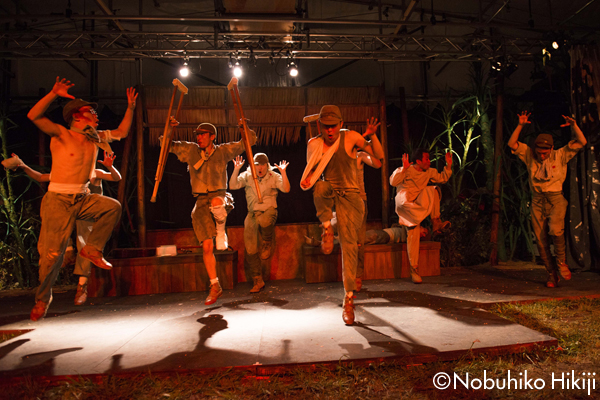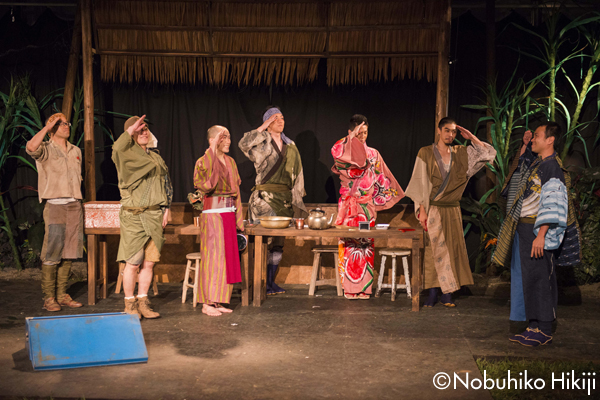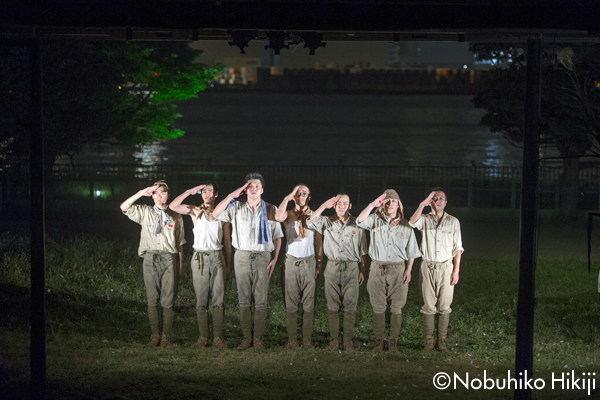


Bed & Makings 3rd production
Minami no Shima ni Yuki ga Furu
(Jun. 12 – 22, 2014 at Special tent theatre in Shiokaze Park-Taiyo no Hiroba, Shinagawa, Tokyo) Photo: Nobuhiko Hikiji
Data
:
Premiere: 2014
Length: 2 hr. 50 min.
Acts/scenes: 2 acts, 26 scenes
Cast: 12 (7 men, 5 women)
Prologue. The actor Tokunosuke Kato is performing the play Seki no Yatappe with his wife Michiyo Kyomachi and older sister Sadako Sawamura when his army draft notice is delivered.
The setting is Manokwari New Guinea. The forlorn Japanese soldiers long for their homeland. Lieutenant Matsuyama suggests to Kato, who is now a corporal, that he use his experience as an actor back home to give the hungry, exhausted soldiers inspiration to continue living by forming a theater “Entertainment Squad.”
The scene changes to an audition venue. From among the soldiers auditioning, most of who can only perform party skits, they choose squad members including private Imagawa, who once recorded a record, private Sukeo Tobihama, who was a country actor, private first class Hikaru Aoto, who had performed under the stage name of Kanta Kisaragi, and, as a stage hand, lance corporal Moshiro Konuma, who is from a family of wig makers. Along with Kato and corporal Toshiaki Kanahara, who was an Asakusa performer, they have what will be their theater troupe.
The scene changes to the soldier barracks. With the incessant arguments about this and between the members, the troupe’s rehearsals are making little progress. Kato, Kanahara and Aoto are talking outside. Kato had seen the real Kanda Kisaragi perform back in Japan and points out that Aoto looks far too different from the Kisaragi he saw. It turns out that Aoto is not the real Kisaragi but was just a touring country actor.
Kanahara argues that they should keep Aoto on, saying that even though he may not be the real thing, it will be a blessing for the fated soldiers to say, “I saw Kanda Kisaragi perform,” before they die. When Kato and says, “I guess someone of your status befits our troupe better,” Aoto steps up to him and counters by asking if Kato can claim that the so-called ‘real theater’ that he performed back in Japan was really of more worth than, “My ‘imitation acting’ that is now helping some of these soldiers to live on another day.”
The scene is a port. On their way to entertain the troops, Sadako and Michiyo were caught in a bombing raid and are now adrift in a boat on a boat at sea.
At the officers’ meeting hall, the Entertainment Squad” are backstage preparing for their performance. The curtain rises and the play begins, but instead of showing any interest in the performance, the soldiers in the audience are boisterously excited by the sight of Japanese kimonos that they never expected to see here in South Pacific war zone and the male actors wearing them in female roles, and even the fake Japanese persimmons made as props. Backstage after the performance, lieutenant Sugiyama makes a proposal to the troupe now depressed and disconsolate at the result of their efforts. His suggestion is that they build a small makeshift theater where they can perform regularly. “There are probably some soldiers in today’s audience for whom this will be the last play they ever see. Let’s perform while we’re still alive! Those who have passed on to the other life will surely come to see our plays too,” says Sugiyama in words that encourage the troupe.
During the first performance at the troupe’s newly built “Manokwari Kabuki-za” theater, the sudden thunder of bombardment cuts the performance short. Though disappointed, the soldiers are excited when they hear that they will get a rare ration of meat from a horse that was killed in the bombardment.
But, when Maekawa who was sent to get the horse meat returns, all he has is a horse’s tail. The troupe delights at the brilliant suggestion that it can be used to make a stage wig, but Imagawa is angry, saying, “I wanted to eat some meat at last.” At this Kato says, “If you consider yourselves actors, let’s eat horse meat to our heart’s content!” These words spark a revelry of acting by the whole troupe, eating, drinking and embracing women of their dreams.
Seeing Tobihama quietly slip outside alone, Kato follows. When Tobihama confides that he has never known a woman’s embrace, Kato tells him that it is also the role of an actor to act out things he has never experienced.
Several days later, they are finally able to perform the full play that had been cut short by the bombardment. After the performance, soldiers from the audience press forward one after another saying how the young girl who appeared in the play as the character “O-Sayo” reminded them of their mother or older sister, or their wife or a first love. Not realizing that Maekawa with his stage makeup and costume now removed is the “O-Sayo” they have just seen on stage, they give him gifts of food, asking him to give it to “her” as they leave.
When the others find out that Maekawa has been using the appeal of his female role to hoard gifts of food for himself, the disgruntled troupe members are quarreling again. There is a suggestion that they all take turns playing the role of O-Sayo, but Maekawa reveals the burden of pain he bears by saying, “Let me be the only one who has to bear the pain of knowing that there are fellow soldiers who die believing that the last woman they loved was O-Sayo, and that those who love me thus are dying on the battlefield one after another.”
It is at this point that an order comes for Kato to return to Japan. Kato is torn by conflicting feelings, but he finally decides to stay with the idea of mounting one last climactic stage.
The final stage. With its climactic sword fight scene staged amidst a dramatic flurry of paper snow, the performance is a great success. After the performance, Tobihama announces to the audience that, “Three days ago, the war ended with Japan’s unconditional surrender.”
Epilogue. The soldiers are taking apart the makeshift theater they had built. It becomes a process in which the tent that has served as the actual performance venue is dismantled to show the audience the contemporary cityscape of Tokyo. And then, the boat carrying Sadako appears and she is reunited with Kato. The soldiers bow in gratitude to the makeshift theater they have dismantled and then go off in their separate ways.


